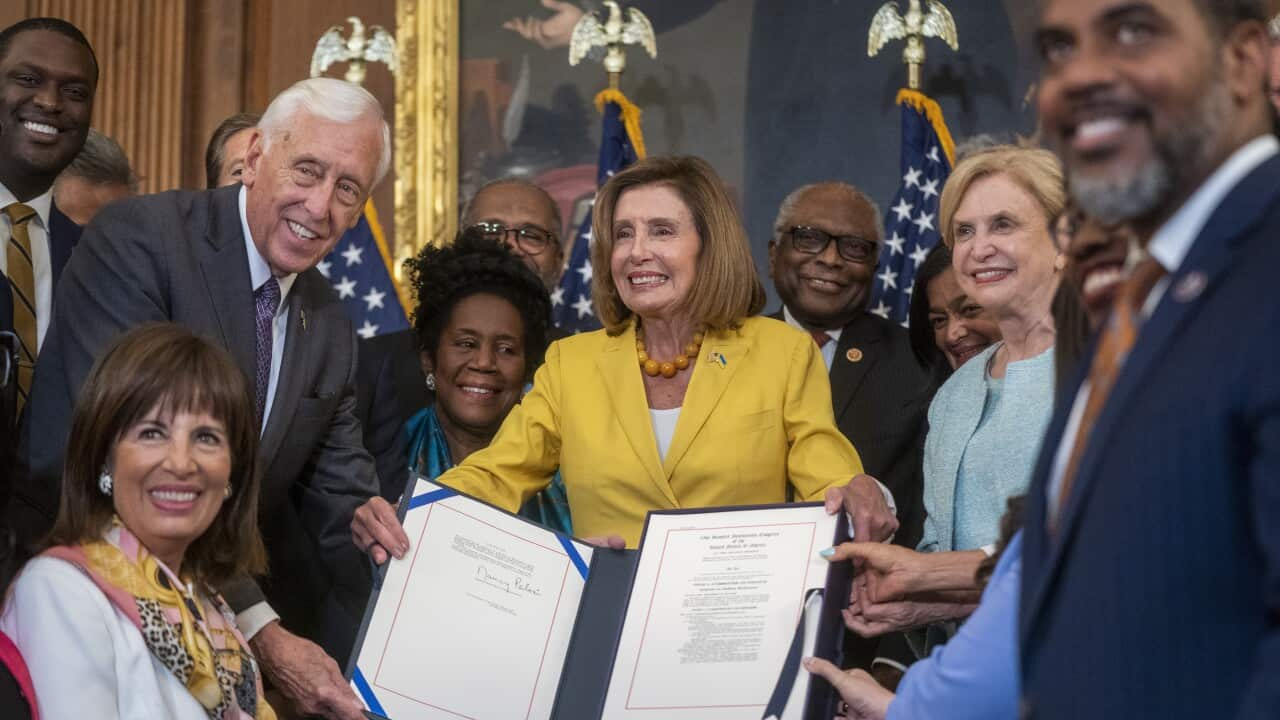The Democratic-led US House of Representatives approved a US$430 billion ($604 billion) bill on Friday that is seen as the biggest climate package in US history, delivering a major legislative victory for President Joe Biden ahead of the 8 November midterm elections.
The legislation to fight climate change and lower prescription drug prices aims to cut domestic greenhouse gas emissions.
It will also allow Medicare to negotiate lower drug prices for the elderly and ensure that corporations and the wealthy pay the taxes they owe.
Democrats say it will help combat inflation by reducing the federal deficit. The House voted 220-207 along party lines to pass the measure titled the "Inflation Reduction Act" and send it on to Mr Biden to sign into law.
The Senate approved the legislation on Sunday after a marathon, 27-hour session. Mr Biden said he would sign the bill in the week ahead, then the White House would hold a celebration on 6 September in honour of what he said was historic legislation.
"Today, the American people won. Special interests lost," Mr Biden said in a Twitter post.
Passage in the House of Representatives along strict party lines came after the approval of the bill in the Senate by a razor-thin margin, with Vice President Kamala Harris casting the tie-breaking vote.
What's in the plan?
Hundreds of billions of dollars for clean energy projects, cheaper prescription drugs and new corporate taxes are a few of the key items in the massive investment plan.
Rather than attempting to punish the biggest polluters in corporate America, the bill put forward by Mr Biden's party instead offers a series of financial incentives aimed at steering the world's biggest economy away from fossil fuels.
Tax credits for clean energy
Tax credits will be given to producers and consumers of wind, solar and nuclear power. It allots up to $7,500 in tax credits to every American who buys an electric vehicle.
Anyone installing solar panels on their roof will see 30 per cent of the cost subsidised.
Around $60 billion will be allocated for clean energy manufacturing, from wind turbines to the processing of minerals needed for electric car batteries.
The same amount will go towards programs to help drive investment in underprivileged
communities, notably through grants for home renovation to improve energy efficiency and access to less polluting modes of transportation.
Huge investments will go into making forests less susceptible to wildfires and protect coastal areas from erosion caused by devastating hurricanes.
The bill aims to help the United States reduce its carbon emissions by 40 per cent by 2030, as compared with 2005 levels.
Billions for health care
The second major aspect of the legislation is to help reduce the huge disparities in access to health care across the United States, notably by reining in skyrocketing prescription drug prices.
Under the new plan, Medicare — the nation's health insurance plan for those aged 65 and older or with modest incomes — will be permitted to negotiate prices of certain medications directly with Big Pharma for the first time, likely yielding far better deals.
The plan requires pharmaceutical companies to offer rebates on certain drugs if the prices rise faster than soaring US inflation. It also extends benefits under Barack Obama's signature Affordable Care Act — known colloquially as Obamacare — until 2025.
Minimum corporate tax of 15 per cent
Alongside these huge investments, the so-called "Inflation Reduction Act" seeks to pare down the federal deficit through the adoption of a minimum corporate tax of 15 per cent for all companies with profits exceeding one billion dollars.
The new tax aims to prevent certain huge firms from using tax havens to pay far less than what they theoretically owe.
According to estimates, the measure could generate more than $258 billion in tax revenue for US government coffers over the next 10 years.
Impact on upcoming elections
Democrats hope the legislation will help them at the polls in November, when voters decide the balance of power in Congress ahead of the 2024 presidential election.
Republicans are favoured to win a majority in the House and could also take control of the Senate. "It is a resounding victory for America's families," Ms Pelosi declared just before the vote, describing the legislation as "a robust cost-cutting package that meets the moment, ensuring that our families thrive and that our planet survives."
Mr Biden plans to travel across the country to tout the bill along with a series of other legislative victories at a time when many voters have soured on him amid soaring inflation.
About half of Americans support the climate and drug pricing legislation, including 69 per cent of Democrats and 34 per cent of Republicans, according to a Reuters/Ipsos poll conducted on 3 and 4 August.
Republicans oppose the legislation, warning it will kill jobs by raising corporate tax bills, further fuel inflation with government spending and inhibit the development of new drugs.
"Democrats more than any other majority in history are addicted to spending other people's money, regardless of what we as a country can afford," House Republican leader Kevin McCarthy said in a floor speech.




